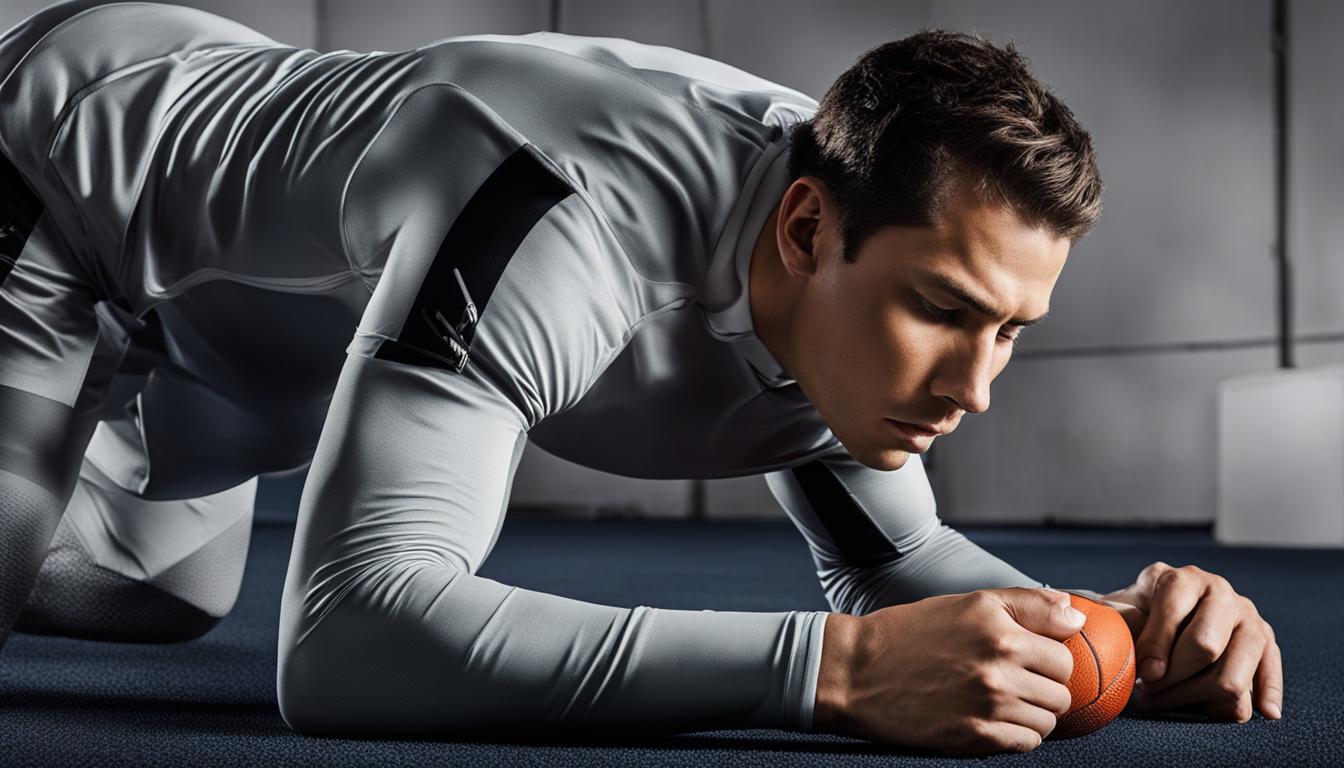Getting a good night’s sleep is not only essential for feeling refreshed and energized the next day but also plays a crucial role in athletic performance. Whether you’re an athlete or just someone who enjoys staying fit, prioritizing sleep is key to reaching your fitness goals.
Sleep hygiene, which refers to healthy sleep habits and practices, is important for maintaining a consistent sleep schedule and optimizing the quality of your sleep. By incorporating good sleep habits into your fitness routine, you can reap the benefits of a well-rested mind and body.
Key Takeaways:
- Sleep is crucial for both athletes and non-athletes to support overall physical and mental health.
- Adequate sleep can lead to improved athletic performance in various aspects, such as speed, accuracy, and endurance.
- Sleep deprivation can have negative effects on athletic performance, including decreased reaction time and increased risk of injury.
- Establishing a consistent sleep schedule and practicing good sleep hygiene are essential for optimizing sleep quality.
- Prioritizing sleep can help prevent illness, support immune system function, and enhance muscle repair and growth.
Why Is Sleep Important For Athletes?
Sleep is of utmost importance for athletes as it plays a crucial role in their rest and recovery, which directly impacts their overall performance. Adequate sleep allows the body to repair and regenerate, leading to improved physical and mental well-being. It is during sleep that muscles recover, and growth hormone is released, facilitating muscle repair and growth. Quality sleep also promotes mental health by enhancing mood and preventing the development of conditions like depression.

Furthermore, sleep is essential for cognitive function and memory consolidation, which are vital for learning new skills and making quick decisions during sports activities. Lack of sleep can lead to decreased reaction time, impaired decision making, and difficulty in learning and retaining skills. Athletes who prioritize sleep are likely to experience improved accuracy, increased stamina, and enhanced cognitive abilities in their respective sports.
Rest and recovery are just as important as intense training and exercise when it comes to athletic performance. By recognizing the importance of sleep and incorporating proper sleep hygiene practices into their routine, athletes can optimize their performance and achieve their fitness goals.
How Does Sleep Affect Athletic Performance?
Sleep plays a crucial role in determining athletic performance. When athletes don’t get enough sleep, it can have a direct impact on their abilities on the field or in the gym. Lack of sleep has been shown to impair reaction time, decrease accuracy, and result in quicker exhaustion during physical exertion. Sleep deprivation also affects cognitive function, making it difficult for athletes to make clear decisions and learn new skills effectively.
Studies have shown that optimal sleep duration and quality are essential for athletes to perform at their best. When athletes are well-rested, they have improved sprint times, enhanced accuracy in sports-specific skills, and increased endurance. Quality sleep also contributes to better cardiovascular and respiratory responses to exercise, reducing the risk of injury and supporting overall physical performance.
It’s important to note that sleep is not only crucial for physical recovery but also for mental well-being. Lack of sleep can lead to irritability, decreased cognitive function, and an increased risk of mental health issues among athletes. On the other hand, sufficient sleep supports optimal immune function, muscle repair, memory consolidation, and learning. By prioritizing sleep, athletes can enhance their performance and promote their overall fitness and well-being.
Sleep Patterns, Quality, Duration, and Recommendations for Athletes
Athletes may have different sleep patterns and requirements compared to non-athletes. The quality and duration of sleep play a significant role in supporting athletic performance. Elite athletes are encouraged to get at least nine hours of sleep nightly, while the standard recommendation for adults is seven to nine hours. Adequate sleep before a competition is likely to enhance performance.
Creating a sleep schedule is an essential aspect of sleep hygiene for athletes. Going to bed and waking up at the same time every day, including weekends, can help regulate the body’s internal clock and promote better sleep quality. Athletes should also create a comfortable sleep environment by ensuring a supportive mattress, using blackout curtains or a sleep mask, and controlling the temperature and noise levels in the bedroom.
“Consistency is key when it comes to sleep for athletes. Establishing a routine can signal to the body that it’s time to sleep, helping athletes fall asleep faster and achieve a deeper, more restful sleep.”
Additionally, practicing relaxation techniques before bed, such as reading, taking a warm bath, or deep breathing exercises, can help athletes wind down and prepare for a good night’s sleep. Avoiding stimulants like caffeine and electronic devices close to bedtime is also recommended to improve sleep quality. By prioritizing sleep patterns, quality, and duration, athletes can optimize their rest and recovery, leading to improved athletic performance.
Sleep Hygiene Tips for Athletes
Proper sleep hygiene is crucial for athletes to improve sleep quality and optimize their performance. Here are some tips to help athletes establish healthy sleep habits:
- Stick to a consistent sleep schedule: Going to bed and waking up at the same time every day, including weekends, helps regulate your body’s internal clock and promotes better sleep quality.
- Create a relaxing bedtime routine: Engage in activities that help you wind down, such as reading a book, taking a warm bath, or practicing relaxation techniques like deep breathing or meditation. Establishing a calming routine signals your body that it’s time to sleep.
- Create a comfortable sleep environment: Invest in a supportive mattress and pillows to ensure optimal comfort. Use blackout curtains or a sleep mask to block out any unwanted light. Control the temperature and noise levels in your bedroom to create a peaceful sleeping environment.
- Avoid stimulants before bedtime: Limit your intake of caffeine and avoid consuming it close to bedtime, as it can interfere with your ability to fall asleep. Additionally, avoid using electronic devices, such as smartphones or tablets, before bed, as the blue light emitted from these devices can disrupt your sleep-wake cycle.
By implementing these sleep hygiene tips, athletes can improve their sleep quality, enhance rest and recovery, and ultimately optimize their athletic performance.

Quote:
“Sleep is the golden chain that ties health and our bodies together.” – Thomas Dekker
The Connection Between Sleep and Exercise
Regular exercise and physical activity have been shown to have a positive impact on sleep. Engaging in moderate-intensity exercise, such as walking or jogging, can help improve sleep quality and duration. Exercise helps to regulate the body’s natural sleep-wake cycle, also known as the circadian rhythm, making it easier to fall asleep and wake up at the desired times. Physical activity during the day can also promote a deeper and more restorative sleep at night.
In addition to improving sleep quality, exercise plays a crucial role in managing stress and anxiety, which are common factors that can contribute to sleep problems. When we exercise, our bodies release endorphins, which are natural mood boosters. These endorphins can help reduce feelings of stress and anxiety, allowing for a more relaxed and restful sleep.
It is important to note that the timing and intensity of exercise can also affect sleep patterns. While moderate exercise can enhance sleep quality, engaging in vigorous exercise too close to bedtime may have a stimulating effect that interferes with falling asleep. It is generally recommended to avoid intense exercise within a few hours of bedtime to allow the body time to wind down and prepare for sleep.
The Benefits of Exercising for Better Sleep
“Regular exercise not only improves sleep quality, but it can also help with falling asleep faster and waking up feeling more refreshed. It is a natural and effective way to promote healthy sleep patterns.”
Exercise has numerous benefits for sleep, including:
- Promoting the release of endorphins, which can help reduce stress and anxiety
- Regulating the body’s natural sleep-wake cycle
- Increasing the amount of deep and restorative sleep
- Improving overall sleep quality
By incorporating regular exercise into your routine, you can enhance your sleep quality and reap the many benefits that come with it. Just remember to find the right balance between exercise and rest, and avoid intense workouts too close to bedtime. With regular physical activity and a healthy sleep routine, you can enjoy better sleep and improved overall well-being.

The Connection Between Sleep and Physical Recovery

Sleep plays a crucial role in the physical recovery of athletes. During sleep, the body undergoes essential processes that promote muscle repair and growth. Muscle tissues that have been stressed during exercise are repaired and rebuilt during deep sleep. Additionally, the production of growth hormone, responsible for muscle repair and growth, is at its highest during this stage of sleep. Therefore, getting sufficient and quality sleep is vital for athletes to optimize their physical recovery and support their muscle development.
Furthermore, sleep is instrumental in regulating inflammation in the body. During sleep, the release of hormones that aid in tissue repair is promoted, which is essential for athletes who put high physical demands on their bodies. By prioritizing sleep, athletes can support the recovery process, reduce inflammation, and enhance their overall physical well-being.
“Sleep is essential for the body to repair and rebuild muscles, while the production of growth hormone peaks during deep sleep” – Expert in Sports Science
Benefits of sleep for physical recovery:
- Repair and rebuilding of muscle tissues
- Production of growth hormone
- Regulation of inflammation
- Release of hormones that aid in tissue repair
By understanding the connection between sleep and physical recovery, athletes can prioritize their sleep and incorporate it as an integral part of their training and recovery routines. Adequate and quality sleep not only supports the growth and repair of muscles but also contributes to overall physical well-being, allowing athletes to perform at their best.
Sleep as an Essential Component of Mental Health

Sleep is not only important for physical health but also for mental health. Quality sleep is associated with improved mood and a decreased risk of developing conditions such as depression and anxiety. Lack of sleep can lead to irritability, decreased cognitive function, and an increased risk of mental health issues. Adequate sleep is crucial for athletes to maintain their mental well-being, as sports often require a high level of cognitive function, decision making, and adapting to new situations.
When we sleep, our brain undergoes essential processes that support emotional regulation and mental well-being. During sleep, neural connections are strengthened, memories are consolidated, and important cognitive functions are restored. Without sufficient sleep, these vital processes are interrupted, leading to negative impacts on mood and overall mental health.
The Impact of Sleep on Mood
Adequate sleep has a direct influence on our mood. When we don’t get enough sleep, we may feel more irritable, impatient, and easily frustrated. Lack of sleep can also impair our ability to manage stress and cope with daily challenges. On the other hand, getting enough quality sleep can help improve our mood, increase resilience to stress, and enhance our overall emotional well-being.
- Improved emotional regulation
- Enhanced stress resilience
- Reduced irritability and mood swings
- Enhanced overall emotional well-being
Getting enough quality sleep is vital for maintaining a positive mood and supporting mental health. It’s important for athletes to prioritize sleep to ensure they can effectively manage the emotional demands of their sport.
In conclusion, sleep plays a crucial role in maintaining mental health. Adequate sleep supports emotional regulation, stress management, and overall well-being. Athletes should prioritize sleep as an essential component of their mental health and overall performance.
The Role of Sleep in Memory Consolidation
Sleep plays a crucial role in memory consolidation and learning. When we sleep, our brains process and store the information we learned during the day, allowing us to better retain and recall that information in the future. It is during sleep that the neural connections that form the basis of memory and skill retention are strengthened, helping us solidify what we’ve learned.
Research has shown that sleep enhances both declarative memory, which involves remembering facts and events, and procedural memory, which involves learning and remembering how to perform specific skills. In fact, a study published in the journal Nature Neuroscience found that participants who slept after learning a new skill showed better retention of that skill compared to those who did not sleep.
Sleep is especially important for athletes who are constantly learning and refining their skills. Whether it’s mastering a new technique or improving performance in their sport, athletes rely on their ability to retain and recall information. By prioritizing adequate sleep, athletes can optimize their learning potential and enhance their future performance.

Furthermore, sleep not only helps consolidate memories, but it also facilitates creativity and problem-solving. When we sleep, our brains continue to work, processing information and making connections that might not have been apparent during wakefulness. This is why it’s often said that we should “sleep on” a problem – our brains are actively working on solutions while we rest.
In conclusion, sleep is essential for memory consolidation and learning. By getting enough quality sleep, athletes can improve their ability to retain and recall information, enhance their problem-solving skills, and optimize their overall performance.
The Impact of Sleep on Immune Function
Sleep plays a vital role in supporting immune function. During sleep, the body produces cytokines, which are hormones that help the immune system fight off infections. Inadequate sleep can impair immune function and increase the risk of illness.
Athletes who prioritize sleep are likely to have a stronger immune system, leading to better overall health and a reduced risk of infections. Quality sleep is essential for athletes to maintain optimal immune function and prevent illness.
To support your immune system, make sleep a priority in your fitness routine. Aim for the recommended seven to nine hours of sleep each night. Creating a relaxing sleep environment can also promote better sleep quality. Invest in a supportive mattress, use blackout curtains or a sleep mask, and control the temperature and noise levels in your bedroom. Avoiding stimulants like caffeine and electronic devices close to bedtime can also contribute to better sleep quality. Prioritize sleep, and your immune system will thank you.

The Importance of Sleep for Preventing Illness
“Sleep deprivation weakens the immune system, making you more susceptible to infections,” says Dr. Sarah Johnson, a sleep expert. “During sleep, your body produces cytokines, which are key to fighting off viruses and bacteria. Lack of sleep reduces the production of these essential cytokines, leaving you vulnerable to illness.”
Quality sleep is like a natural vaccine. It strengthens your immune system, enabling it to function at its best and defend your body against potential threats.
Proper sleep hygiene is crucial for athletes to maintain optimal immune function. Make sleep a priority, and you’ll not only boost your athletic performance but also keep illness at bay. Remember, sleep is not a luxury but a necessity for overall health and well-being.
The Effects of Sleep Deprivation on Athletic Performance
Sleep deprivation can have a significant negative impact on athletic performance. When athletes consistently lack sufficient sleep, their ability to perform at their best is compromised. Sleep loss can lead to a range of detrimental effects, including decreased sprint times, reduced accuracy in sports-specific skills, quicker exhaustion, impaired reaction time, and difficulty learning and making decisions. The physical demands of sports require athletes to be at their peak, and sleep deprivation can greatly hinder their overall performance.
One of the key ways in which sleep deprivation affects athletic performance is through its impact on physical exertion. When athletes are sleep-deprived, they experience increased perceived exertion during physical activity. This means that tasks that would typically be considered less challenging or require less effort may feel more difficult and exhausting. As a result, athletes may struggle to maintain their usual performance levels and may not be able to push themselves as much during training or competition.
Furthermore, sleep loss can also have a detrimental effect on an athlete’s immune function. During sleep, the body produces cytokines, which are hormone-like substances that help regulate the immune system and protect against infections. When athletes do not get enough sleep, their immune function is compromised, making them more susceptible to illness and infections. This can significantly impact their ability to train consistently and perform at their best, as they may need to take more time off to recover.
The Importance of Prioritizing Sleep for Athletes
Given the negative effects of sleep deprivation on athletic performance, it is crucial for athletes to prioritize getting enough sleep. Adequate sleep provides numerous benefits, including better reaction time, improved decision-making abilities, enhanced physical endurance, and reduced risk of injury. By making sleep a priority and ensuring they get enough rest, athletes can optimize their performance and give themselves the best chance of success in their chosen sport.

In conclusion, sleep deprivation can have a profound impact on athletic performance. Athletes who consistently lack sufficient sleep may experience decreased speed, accuracy, endurance, and cognitive function, as well as an increased risk of injury and illness. By recognizing the importance of sleep and implementing strategies to improve sleep quality and duration, athletes can optimize their performance and support their overall fitness goals.
Conclusion
Sleep plays a vital role in fitness and athletic performance. It is not just about resting; quality sleep is essential for rest, recovery, and overall physical and mental well-being. Studies have shown that increasing the quantity and quality of sleep can lead to improved athletic performance in various aspects of sports, including speed, accuracy, endurance, and cognitive function.
On the other hand, sleep deprivation can have detrimental effects on overall performance. Lack of sleep can lead to decreased sprint times, reduced accuracy in sports-specific skills, quicker exhaustion, impaired learning and decision-making, increased risk of injuries, and compromised immune function. Athletes who consistently lack sleep may experience a decline in their performance and face an increased risk of physical and mental health problems.
Hence, it is crucial for athletes to prioritize sleep and follow proper sleep hygiene practices. This includes establishing a consistent sleep schedule, creating a comfortable sleep environment, and practicing relaxation techniques before bedtime. Adequate sleep before competitions can also enhance performance. By prioritizing sleep, athletes can optimize their performance, reduce the risk of injuries and illnesses, and support their fitness goals.
FAQ
How does sleep impact athletic performance?
Sleep plays a crucial role in athletic performance by promoting rest and recovery, improving cognitive function, and preventing illness. Adequate sleep leads to improved speed, accuracy, endurance, and decision-making abilities in athletes.
Why is sleep important for athletes?
Sleep is important for athletes because it supports rest and recovery, helps in the formation of memories, improves cognitive processing, and promotes mental health. Lack of sleep can negatively affect overall performance and increase the risk of injuries and illnesses.
How does sleep affect athletic performance?
Lack of sleep can lead to decreased speed, accuracy, reaction time, and endurance in athletes. It can also impair learning, decision-making abilities, and immune function. Adequate sleep is crucial for optimizing athletic performance.
How is sleep different for athletes?
Athletes may have different sleep patterns and requirements compared to non-athletes. It is recommended for athletes to get at least nine hours of sleep nightly to support their physical and mental performance. Creating a consistent sleep schedule and maintaining good sleep hygiene are crucial for athletes.
What are some sleep hygiene tips for athletes?
Athletes can improve their sleep quality by establishing a consistent sleep schedule, creating a relaxing bedtime routine, maintaining a comfortable sleep environment, and avoiding stimulants close to bedtime. Regular exercise can also promote better sleep, but intense exercise close to bedtime should be avoided.
How does sleep support physical recovery?
During sleep, the body repairs and rebuilds muscles, releases growth hormone for muscle growth and repair, and regulates inflammation to support physical recovery. Adequate sleep is essential for athletes to optimize their physical recovery and support muscle growth.
How does sleep impact mental health?
Quality sleep is associated with improved mood and decreased risk of mental health conditions such as depression and anxiety. Lack of sleep can lead to irritability, decreased cognitive function, and an increased risk of mental health issues. Adequate sleep is crucial for athletes to maintain their mental well-being.
How does sleep affect memory and learning?
Sleep plays a vital role in memory consolidation and learning. During sleep, the brain forms and strengthens neural connections required for skill retention. Without sufficient sleep, the brain’s pathways for learning and memory cannot be properly formed or maintained.
How does sleep support immune function?
Sleep helps the body produce cytokines, which help the immune system fight off infections. Inadequate sleep can impair immune function and increase the risk of illness. Quality sleep is essential for athletes to maintain optimal immune function and prevent illness.
What are the effects of sleep deprivation on athletic performance?
Sleep deprivation can lead to decreased speed, accuracy, reaction time, and endurance in athletes. It can also impair learning, decision-making abilities, and increase the risk of injuries and illnesses. Adequate sleep is crucial for athletes to optimize their performance and avoid the detrimental effects of sleep deprivation.


